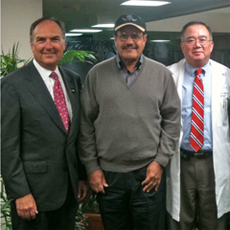News Release
Bascom Palmer Receives $10 Million Gift
Note: Nasser Ibrahim Al-Rashid and other members of the Al-Rashid Family all contributed to this $10 million gift. (Updated March 21, 2022)
MIAMI, November 28, 2012 —One of the world’s most prominent businessmen and leading philanthropists has donated $10 million to the Bascom Palmer Eye Institute at the University of Miami to establish an interdisciplinary research center dedicated to eradicating blinding injuries and lethal orbital malignancies.
The gift from Saudi Arabia’s preeminent builder, Nasser Ibrahim Al-Rashid, Ph.D., the founder and chairman of Rashid Engineering who lost vision in one eye as a child, is the largest the nation’s top-ranked ophthalmology program has received during Momentum2: The Breakthrough Campaign for the University of Miami. It will establish the Dr. Nasser Ibrahim Al-Rashid Orbital Vision Research Center in the Miller School’s Evelyn F. and William L. McKnight Vision Research Center.
The Bascom Palmer surgeon Al-Rashid credits for preserving the sight in his other eye, David T. Tse, M.D., professor of ophthalmology and holder of the Dr. Nasser Ibrahim Al-Rashid Chair in Ophthalmic Plastic, Orbital Surgery and Oncology, will serve as director of the center.
“This is an extraordinary gift by an exceptional humanitarian who is passionate about advancing biomedical research into a broad range of eye diseases that have few effective therapies,” said Eduardo C. Alfonso, M.D., professor and chair of Bascom Palmer. “Dr. Al-Rashid’s investment in the future, coupled with Dr. Tse’s expertise in performing lacrimal, eyelid, and orbital reconstructive surgeries needed for disease or injury, will ensure the Dr. Nasser Ibrahim Al-Rashid Orbital Vision Research Center will improve the quality of life for generations of patients worldwide.”
The center, which will be the first cure-based orbital research laboratory of its kind, will assemble a broad array of research scientists and clinicians who are focused on finding novel therapies for orbital cancers and traumatic optic nerve injuries, as well as developing clinical applications for stem cell and biomedical studies. The center’s underlying goal is nurturing a scientific mindset for multidisciplinary innovation and collaboration by removing barriers and promoting interactions among investigators from different disciplines.
“In addition to basic scientific research, the center will serve as a focal point for attracting scholars from around the world to Bascom Palmer for ophthalmic learning and to exchange educational ideas for mutual gain,” said Al-Rashid, a longtime patient of Tse’s who has supported his work for more than two decades. “We view this center as the incubator for the next generation of thought leaders in orbital surgery.”
Tse said Al-Rashid’s gift will transform orbital research by hastening the discovery and implementation of new treatment and prevention strategies. “His generous gift will have a profound impact on scientific discovery,” Tse said. “This center in Dr. Al-Rashid’s name is an appropriate tribute to his philanthropy for humanity and affirms his commitment to medical advancement.”
Tse, who specializes in oculofacial plastic surgery, reconstructive surgery, orbital surgery, and oncology, has a track record of translating research discoveries into innovative clinical solutions, especially for conditions dear to Al-Rashid’s heart: orbital cancers and children born without an eye. For example, Tse improved the ten-year survival rate of adenoid cystic carcinoma, a particularly aggressive form of cancer in the tear-producing lacrimal gland, from about 20 percent to 85 percent by developing a treatment protocol that shrinks the tumor with a high and targeted dose of chemotherapy before surgical removal.
He also developed a cost-effective and aesthetically superior alternative to the multiple surgeries children born with one eye must endure to accommodate the ever-larger implants that expand their orbital bone structure and reduce facial disfigurement as they grow. Collaborating with a medical device manufacturer, Tse developed an inflatable tissue expander that is anchored to the socket bone and, like a balloon, inflated with increasing volumes of fluid to stimulate gradually appropriate bone growth and eliminate the need for repeated surgeries.
Al-Rashid, a longtime engineering consultant to Saudi Arabia’s royal court, earned his undergraduate and doctoral degrees in engineering from the University of Texas at Austin. Joining the faculty of King Fahd University of Petroleum and Minerals in Dhahran, Saudi Arabia, he served as dean of business affairs and dean of engineering before leaving academia in 1975 to establish Rashid Engineering. In its infancy, the firm etched its name in the annals of construction lore by building a world-class resort hotel at the behest of King Khaled in just eight months.
In the ensuing decades, Al-Rashid played a pivotal role in the kingdom’s economic evolution and educational transformation, participating in more than 120 major construction projects, including hospitals, schools, convention centers, and government complexes. He is the principal architect and builder of the largest and most modern eye hospital in the Middle East—the King Khaled Eye Specialist Hospital in Riyadh.
In addition to the chair Tse holds, Al-Rashid also endowed the Dr. Nasser Ibrahim Al-Rashid Chair in the Division of Hepatology/Schiff Center for Liver Diseases held by Eugene Schiff, M.D., Leonard Miller Professor of Medicine and director and founder of the Schiff Center for Liver Diseases.
# # #
Momentum2: The Breakthrough Campaign for the University of Miami seeks to advance learning, elevate scholarship, and make bold strides in health care in the community, across the country, and around the world. Momentum2 comes on the heels of the institution’s record-breaking Momentum: The Campaign for the University of Miami, which concluded at the end of 2007 and raised more than $1.4 billion for endowed chairs and professorships, scholarships, facilities, academic and medical programs, and other initiatives.
www.miami.edu/momentum2.
The University of Miami’s mission is to educate and nurture students, to create knowledge, and to provide service to our community and beyond. Committed to excellence and proud of our diversity of our University family, we strive to develop future leaders of our nation and the world. www.miami.edu
